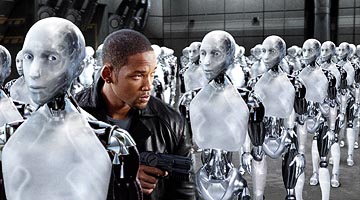I, Robot. You, dumb screenwriter.
 Scott and I went to see I, Robot this weekend. Contrary to my previous beliefs, they did in fact retain the comma in the title, which is nice. That they could only credit Isaac Asimov with having "suggested" and "inspiring" the story was not so nice, especially as the characters were, for the most part, his. But this is picking the smallest of nits, and there are things wrong in this movie that are so much larger. (Minor spoilers ahead.)
Scott and I went to see I, Robot this weekend. Contrary to my previous beliefs, they did in fact retain the comma in the title, which is nice. That they could only credit Isaac Asimov with having "suggested" and "inspiring" the story was not so nice, especially as the characters were, for the most part, his. But this is picking the smallest of nits, and there are things wrong in this movie that are so much larger. (Minor spoilers ahead.)
You can read our general take on the movie by clicking over to Scott's blog entry on same. It was "inspired by" a conversation we had upon exiting the theater. There you'll find all the things that were good about the movie, and there were many.
The screenplay is a lazy piece of work that takes the Asimov's Three Laws of Robotics to what seems like a logical conclusion -- if you're a sociopathic robot who deems your own judgment to be above that of your creators. As in the original Asimov stories, this movie posits that the Laws of Robotics may be bent or seemingly ignored by dint of interpretation or rationalization. As with most Hollywood translations of such stories, however, the example in question is the most violent and exaggerated distortion of such rationalizations possible.
In Asimov's universe, Robots seemingly violated the Laws all the time, and a character named Susan Calvin (prettied up in the form of the capable Bridget Moynahan for the film) became the first "robopsychologist" to handle such cases. In the world of the film, everything is rosy until one robot warps his interpretation of the Three Laws to the point of megalomania. (We're supposed to believe that no one has ever found a way to trick robots into unknowingly harming a human or even committing a petty crime.) Dr. Calvin, always the smartest person in any of the robot stories, here appears dumbfounded that a robot could manage to interpret the Three Laws in anything but the most literal of terms. It's an insult to her (admittedly fictional) intelligence and ours.
In our own time, when humanoid robots are just beginning to come into existence, volumes have been written about the Three Laws and their inadequacy to properly govern robotic behavior. Are we supposed to believe that, in the future, a multi-jillion dollar company like U.S. Robotics never thought to examine these laws as closely?
Another less dire point is that the new "NS5" robots are, at various points in the picture, forced to do harm by remote control through the U.S. Robotics wireless internet link that allows them to download their new program sets. (When the link is severed, they return to their benign Three Laws Safe behavior.) Once again, lazy scripting strikes: consumers would be aghast to discover that the Three Laws are imprinted so poorly as to be overruled by radio signal. Could not the robots' latest software update include an explanation of the rogue robot's interpretation of the Laws? Wouldn't that accomplish the same thing? Of course not, say the writers, and besides, such a development would leave our heroes with a more complicated problem that couldn't be wrapped up in a happy Hollywood ending.
Alex Proyas has made a film that is a joy to the eye; what a shame that his vision and budget were wasted on such a flawed story. Quick, someone give him the time and money to develop a Robot trilogy with more literal -- and more interesting -- adaptations of the original Asimov stories. Or heck, why not finally produce that Asimov-approved Harlan Ellison script that's been bouncing around for years now?


1 Comments:
If you are interested in acting career, think you need to study the list of these acting schools.
Post a Comment
Subscribe to Post Comments [Atom]
<< Home